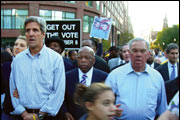Boston honors Selma's civil rights activists
Unitarian Universalists cosponsor march, remember civil rights martyrs.
The anniversary had particular significance for Unitarian Universalists because two UUs were killed during the civil rights protests in Alabama that led to the passage of the federal law protecting African Americans’ right to vote.
The Rev. James J. Reeb, who had traveled from Boston to Selma, Ala., to join the protests, died after white assailants attacked him and two other UU ministers less than a day after he arrived. Four days after Reeb’s death on March 11, 1965, President Lyndon B. Johnson mentioned him in an address to Congress calling for the passage of the Voting Rights Act. Two weeks later, Viola Gregg Liuzzo of Detroit, Mich., a UU church member who had driven to Alabama to help with the march from Selma to Montgomery, was murdered by the Ku Klux Klan.
Unitarian Universalists provided support for last week’s march, too, although the political context had changed dramatically. Sunday’s march began with a rally on the steps of the First Church in Roxbury, which houses the Unitarian Universalist Urban Ministry, one of the event’s sponsors.
The Rev. William G. Sinkford, president of the Unitarian Universalist Association of Congregations, marched with supporters of the UU Urban Ministry and addressed a post-march rally on Boston Common. Sinkford praised the efforts of individuals like Rosa Parks and James Reeb, but reminded the audience that each person was part of a “community of resistance.”
Members and clergy from several UU congregations joined the march, including a contingent from the Arlington Street Church who carried signs with the church’s slogan, “Gathered in Love and Service for Justice and Peace.” Reeb had been a member of the congregation.
Congressman John Lewis of Georgia, a longtime civil rights activist, led the march with a large contingent of Massachusetts politicians, religious leaders, and community organizers, including Senator John Kerry and Boston Mayor Thomas Menino. In March 1965, Lewis was badly beaten when state troopers attacked civil rights marchers in Selma. Television footage of that attack generated outrage throughout the country and inspired many white people, including Reeb and Liuzzo, to travel to Selma to join the protests.
“The right to vote is precious&emdash;almost sacred,” Lewis said at the First Church in Roxbury in a speech recounting his experience at Selma. He said he was returning to Washington that night and would go directly to the Capitol, where Rosa Parks was lying in honor. “I’m going to tell Rosa Parks that Boston is doing all right,” he said at the post-march rally on Boston Common. “Boston is doing its part to keep the struggle going.”
“In 2005, we won’t be beaten. We won’t go to jail,” he told African Americans in the audience. “We just have to get up and go to the polls and vote like we’ve never done it before.”
Sunday’s march followed the 2 1/2-mile route of an April 1965 march led by the Rev. Dr. Martin Luther King Jr. protesting school segregation in Boston. State legislator Byron Rushing recalled participating in that march. “This was an incredibly segregated city,” he said. “Boston is better than it was in 1965, but . . . we are not what we want to be.”
The UU Urban Ministry runs social service programs in Roxbury, a low-income neighborhood of Boston. Supported by sixty UU congregations in eastern Massachusetts, the Urban Ministry sponsors educational programs for youth, a shelter for women and children seeking refuge from domestic violence, and counseling for men in the criminal justice system.








